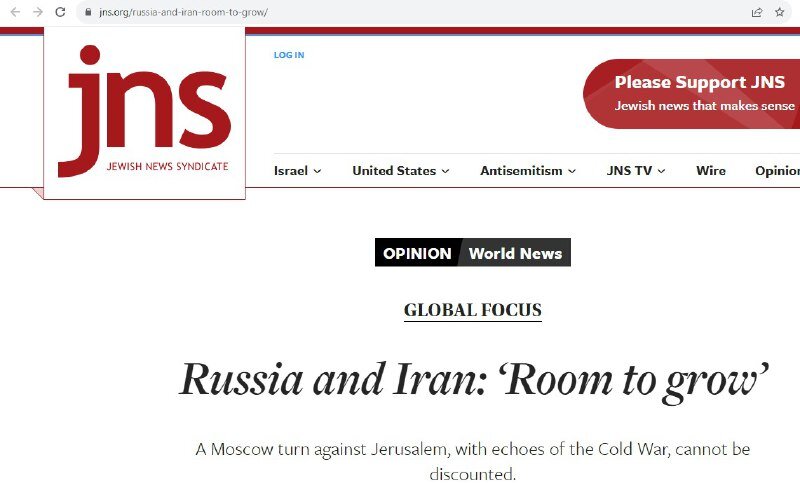Growing concerns in U.S. over strengthening Tehran-Moscow alliance

TEHRAN- On October 6, the Jewish News Syndicate (JNS) published an article titled “Russia and Iran: ‘Room to Grow’”, raising alarms over the evolving Tehran-Moscow alliance.
The weekly columnist, Ben Cohen, probed the Iran-Russia partnership trying to caution Western leaders by demeaning cooperation between Iran and Russia.
This is while the West has more to worry about than the bilateral ties between Iran and Russia; the growing clout of regional powers, an accelerated path towards multilateralism and the looming decline of the U.S. are parts of what keeps Western leaders from sleeping at night.
Tehran-Moscow deals, Moscow-Kyiv conflict; far-fetched comparison
“The most dangerous aspect of the relationship concerns the transfer of weapons between the two countries ... Iran has supplied Russia with thousands of Shahed-136 and Mohajer-6 drones that have been used to devastating effect against Ukraine’s civilian infrastructure,” claimed the article, adding that the destruction of Ukrainian infrastructure is mostly to blame on the decimating effects of Iranian drones.
Iranian top diplomats kept inviting both sides of the Ukraine conflict to show the utmost restraint during the escalation of tensions. Whatever the military MOU between Tehran and Moscow, tracing back to months before the beginning of the Ukraine war, has nothing to do with the ongoing conflict.
On July 21, 2023, Iranian Foreign Ministry spokesman Nasser Kanaani, responding to alleged Western claims that Iran is providing drones to Russia, suggested a “diplomatic path” as a way to put an end to the Russia-Ukraine war.
Yet NATO’s cost-effectiveness policy to counter Russia within Ukraine's soil by exploiting Ukrainian human resources along with the concerns of the West toward the Russia issue ignited the West’s avarice to get closer and closer to the Russian borders. As a result, the ongoing conflict has turned into a dilemma.
The roadmap for Tehran, Moscow cooperation
Earlier on July 19, 2022, Leader of the Islamic Revolution Ayatollah Seyyed Ali Khamenei received Russia’s Putin.
The Leader described economic cooperation between Iran and Russia, particularly following the sanctions imposed by the West, as essential and beneficial to both countries.
The Leader of the Revolution stressed that the West is opposed to the existence of a strong, independent Russia. He also described NATO as being a dangerous entity and added, “The NATO alliance will know no limits once it sees the situation fit. If it hadn’t been stopped in Ukraine, it would have later started a similar war in Crimea.”
The Leader touched on the popular de-dollarization policy which includes replacing the U.S. dollar with the national currency of each country stating, “The dollar should be gradually removed from global transactions, and this is possible over time.”
The need for further mutual cooperation, fulfillment of the memorandums of understanding, oil and gas sectors, and removal of the dollar from global transactions were among the key terms of discussion in the official meeting.
Virtually addressing the 15th BRICS participants in August 2023, the Russian president stressed the practical role of the group to promote mutual trade and investments, enhance cooperation and expand direct dialogue among the business communities.
The group, according to Putin, effectively contributes to the acceleration of socio-economic growth of the states and leads to the Sustainable Development Goals (SDGs).
Causes of the West’s concerns
The United States, entangled in domestic issues and challenged by China's growing influence, is no longer the primary global player.
Coalitions such as BRICS and the Shanghai Cooperation Organization (SCO) prove the willingness of various countries to free themselves from the tight grip of the United States.
The U.S. appears to have lost its leading role. Unilateralism is gradually being replaced by multilateralism.
Western think tanks propagate demonization of the Tehran-Moscow alliance, focusing on military MOUs while staying concerned about American decline.
Cohen follows the footsteps of those policymakers who consider every coalition and collaboration outside the U.S. and the West’s interests dangerous and threatening.
Leave a Comment